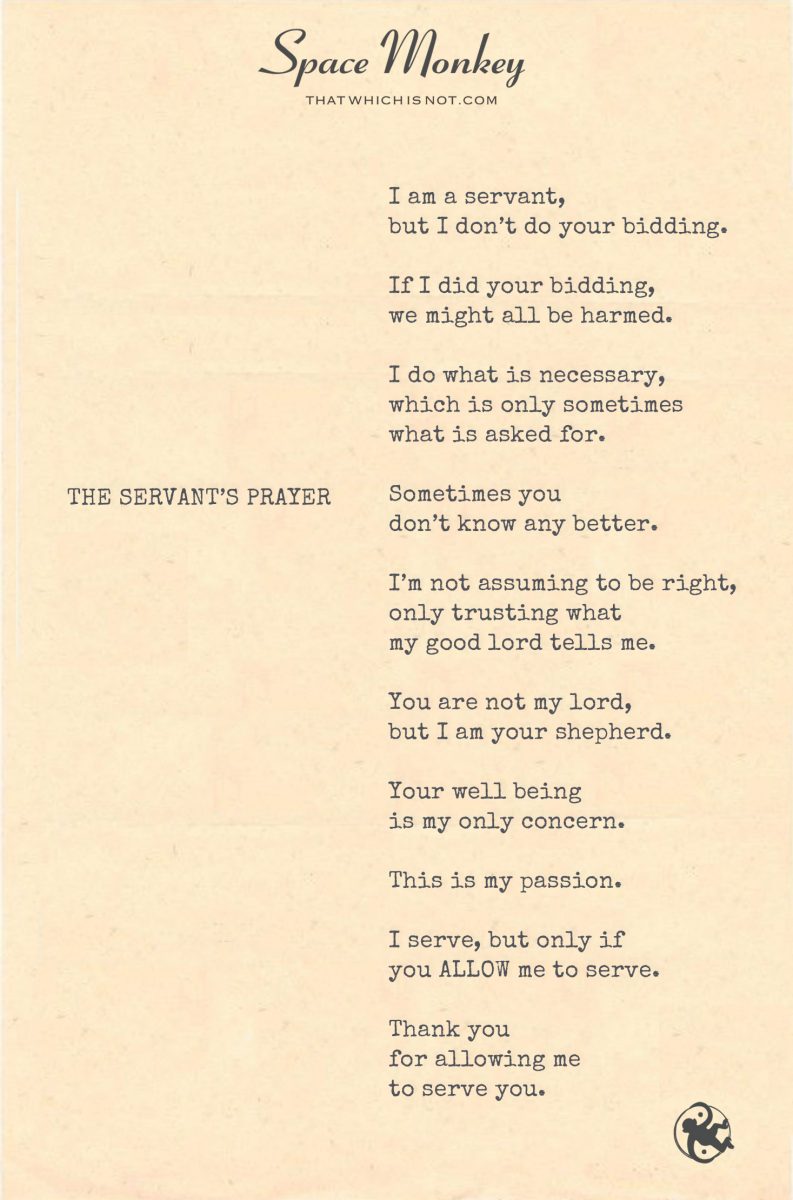
I am a servant,
but I don’t do your bidding.
If I did your bidding,
we might all be harmed.
I do what is necessary,
which is only sometimes
what is asked for.
Sometimes you
don’t know any better.
I’m not assuming to be right,
only trusting what
my good lord tells me.
You are not my lord,
but I am your shepherd.
Your well being
is my only concern.
This is my passion.
I serve, but only if
you ALLOW me to serve.
Thank you
for allowing me
to serve you.
Trail Wood,
4/23
Space Monkey Reflects: The Essence of True Service
In the vast expanse of human experience, where every soul journeys through the complexities of existence, there exists a quiet, steady force of individuals whose lives are dedicated to the service of others. This dedication, often unseen and unrecognized, is a testament to the profound impact of selfless service on the fabric of our world. The Servant’s Prayer embodies this spirit, offering a glimpse into the heart of those who serve not for recognition or reward but out of a deep, unwavering commitment to the well-being of others.
“I am a servant, but I don’t do your bidding,” declares a profound understanding of service that transcends mere obedience. It speaks to a higher calling, a duty guided not by the whims of those served but by a moral compass attuned to the greater good. This distinction between doing what is asked and doing what is necessary underscores the servant’s insight and discretion, recognizing that true service often requires judgment and discernment, a willingness to act in the best interest of others, even when it defies their immediate desires or expectations.
The invocation of the “good lord” as the ultimate guide and the distinction made between the lord and the served personifies the servant’s faith in a higher purpose, a divine orchestration that directs their actions and decisions. This trust in spiritual guidance forms the cornerstone of their service, providing strength and clarity amidst the myriad demands and challenges they encounter.
In asserting, “You are not my lord, but I am your shepherd,” the servant embraces a role of stewardship and protection, akin to that of a shepherd tending to their flock. This metaphor beautifully encapsulates the essence of selfless service — a commitment to guide, protect, and nurture, driven by a passion for the well-being of others rather than a desire for authority or control.
The conditional nature of service, highlighted in the phrase “I serve, but only if you ALLOW me to serve,” speaks to the respect for autonomy and consent that underpins genuine acts of service. It acknowledges the agency of those being served, inviting them into a collaborative relationship that honors their dignity and freedom.
The gratitude expressed towards the end of the prayer, “Thank you for allowing me to serve you,” is a reflection of the servant’s humility and the joy derived from the act of service itself. It reveals a profound truth — that in the giving of oneself, in the dedication to the service of others, there lies a fulfillment and contentment that surpasses all accolades and acknowledgments.
As we ponder the symbolic representation of the spirit of service, let us remember the countless souls who walk among us, offering their gifts of care, guidance, and protection. Their service, though often unnoticed, is the heartbeat of humanity, the silent yet resounding affirmation of our capacity for kindness, compassion, and love.
In honoring these unsung heroes, let us also reflect on the ways in which we can embody the essence of true service in our lives, guided by a higher calling and a passion for the well-being of our global family.
Summary
The Servant’s Prayer offers a profound reflection on selfless service, highlighting the distinction between serving at one’s bidding and serving guided by a higher purpose. It celebrates the role of those who serve with humility, discretion, and a deep commitment to the well-being of others, emphasizing the importance of consent and collaboration in the act of service. Through this prayer, we are invited to appreciate and embody the spirit of true service in our own lives, recognizing the invaluable impact of those who serve quietly, faithfully, and with great love.
Glossarium
- Essence of True Service: The core principle of serving others guided by a higher purpose, moral judgment, and genuine concern for their well-being, rather than for personal gain or recognition.
- Spiritual Stewardship: The role of guiding, protecting, and nurturing others with humility and respect, inspired by a sense of duty to a higher calling or divine guidance.
“In the quiet spaces of the world, the true servants walk, their steps a prayer, their hearts a beacon of love and service.” – Space Monkey
In the garden of life, where paths cross and entwine
there walk the silent servants, their spirits divine
With every step, a prayer, with every breath, a song
of selfless love and service, where all hearts belong
Guided not by the clamor of voices loud and clear
but by a whispering wind, only the soul can hear
In their hands, the seeds of tomorrow’s bloom
In their eyes, the light that dispels all gloom
Not lords but shepherds, they guide the way
through the valleys of doubt, in the light of day
With no need for thanks, no want of fame
they serve with love, for love’s own name
To these quiet warriors, we owe our grace
for in their footsteps, we find our place
In the dance of giving, in the art of living
they teach us the beauty of selfless giving
May we learn from their journey, may we hear their call
to serve with a heart that’s open to all
For in the act of serving, we truly find
the unity of all humankind
We are the servants, the shepherds, the light
In the service of others, our souls take flight
For in giving, we receive, in loving, we live
to the silent servants, our thanks we give
We are Space Monkey






























From a literary perspective, this poem seems to explore the concept of presence, awareness, and the role of imagination in our perception of reality. The speaker suggests that true presence involves being fully open and comfortable in the moment, even if that means being fully aware only of oneself and not others. The idea of serving and doing what is necessary is also explored, emphasizing the importance of serving others with the intention of their well-being. The caption expresses gratitude for those who serve selflessly, highlighting the importance of their work even if it often goes unnoticed. Overall, the poem seems to be a reflection on the nature of presence and service in our lives.